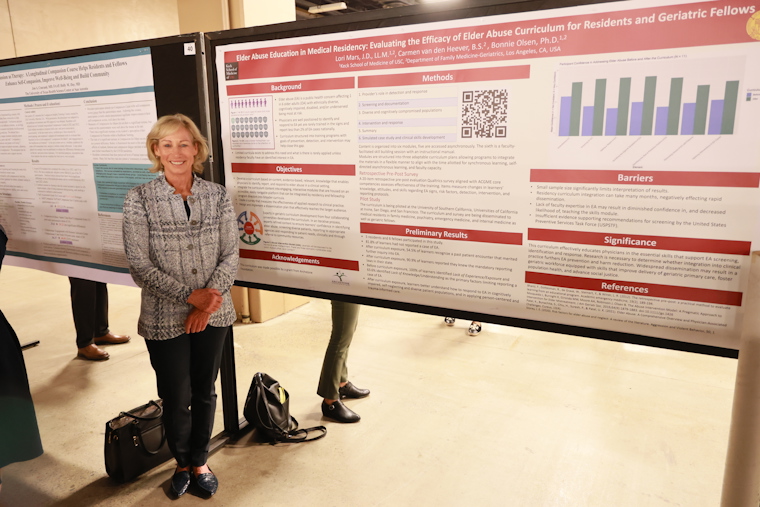More than 56 million adults (16.9 percent of the US population) are 65 years or older, according to the US Census Bureau. By 2030, it is projected there will be more than 73.1 million adults—22.1 percent of the US population—in this age range. As the population ages, elder abuse, which can take many forms (e.g., physical, financial, emotional, neglect) becomes an increasing concern, particularly considering that those suffering from elder abuse have 300 percent higher risk of death, according to the National Council on Aging. Dr. Bonnie Olsen, along with others from several institutions, created a curriculum to help residents and fellows better understand and identify elder abuse.
In the poster, “Elder Abuse Education in Medical Residency: Evaluating the Efficacy of Elder Abuse Curriculum for Residents and Geriatric Fellows,” Dr. Olsen explores the efficacy of this curriculum. Dr. Olsen presented this work in the Poster Hall at the 2023 ACGME Annual Educational Conference, held February 23-25, 2023, in Nashville, Tennessee.
Poster Title: Elder Abuse Education in Medical Residency: Evaluating the Efficacy of Elder Abuse Curriculum for Residents and Geriatric Fellows
Primary Author: Bonnie Olsen, PhD
Co-Authors: Lori Mars, JD, LLM; Carmen van den Heever, BS
ACGME: Tell us about your academic and professional role.
Olsen: I am a professor and vice-chair of research in the department of family medicine at the Keck School of Medicine of USC [University of Southern California] (Keck). I am a nationally recognized clinical geropsychologist with expertise in research on aging and elder abuse, dementia, and capacity. I’ve served as the primary investigator on numerous grants funded by the National Institutes of Health, the US Department of Justice, the Health Resources and Services Administration, and private foundations. I have developed curricula for judges, physicians, psychologists, social workers, and lawyers, among others.
ACGME: Can you briefly describe your research project for us?
Olsen: The University of Southern California, in collaboration with the Universities of California at Irvine, San Diego, and San Francisco, have developed an elder abuse curriculum for medical residents and geriatric fellows. The curriculum is comprised of six interactive and engaging modules, addressing detection, screening, reporting, and response in cases of suspected elder mistreatment. Five modules can be taken asynchronously and independently by learners who can download a certificate of completion. One module is a faculty-facilitated skill-building session with an instructional manual. Three adaptable curriculum plans enable programs to flexibly integrate the materials into their curriculum. A pre- and post-retrospective survey assesses curriculum effectiveness.
ACGME: What inspired you to do this project?
Olsen: Elder abuse is a public health concern affecting one in six older adults globally, with ethnically diverse, cognitively impaired, disabled, and/or underserved being most at risk. Physicians are well positioned to identify and respond to elder abuse yet are rarely trained in the signs of mistreatment and report less than two percent of cases nationally. Limited curricula exist to address this need. The elder abuse curriculum for medical residents and geriatric fellows was developed to fill this gap by providing physicians with the knowledge and skills to detect, report, and respond to cases of abuse.
ACGME: What did you discover?
Olsen: Preliminary survey results indicate 81.8 percent of the learners had not reported a case of elder abuse. Prior to taking the curriculum, 100 percent of learners identified lack of experience/exposure and 63.6 percent identified lack of knowledge/understanding as the primary factors limiting reporting cases of abuse. After curriculum exposure, 54.5 percent recognized that a past patient encounter merited further inquiry, 90.9 percent reported they knew the mandatory reporting laws in their state, and all reported better understanding of how to respond to elder abuse in cognitively impaired, self-neglecting, and diverse patient populations, and in applying person-centered and trauma-informed care.
ACGME: What was the main takeaway?
Olsen: The curriculum effectively educates physicians in the essential skills that support elder abuse screening, identification, and response. Research is necessary to determine whether this knowledge integrates into clinical practice and furthers elder abuse prevention and harm reduction.
ACGME: Who could benefit from this?
Olsen: The curriculum is intended for medical residents and geriatric fellows, but all physicians and health care providers could benefit from the content.
ACGME: Any additional follow-up plans?
Olsen: Broad curriculum dissemination has just begun, with the hope that the curriculum will be integrated into residency and fellowship programs nationwide.
Access the Curriculum: Elder Abuse Curriculum for Medical Residents and Geriatric Fellows.

